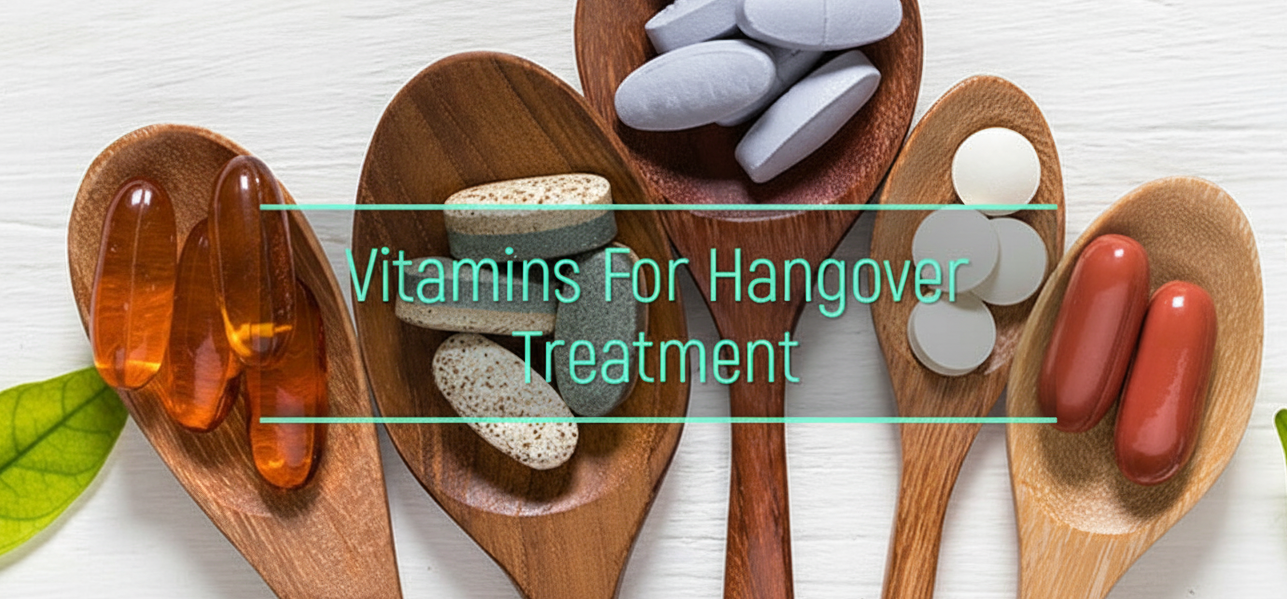Hangovers are uncomfortable, draining, and disruptive to everyday life. For years, many people have turned to vitamins and minerals to speed recovery and restore energy after drinking. While they aren’t a complete cure, they play a key role in replenishing what alcohol depletes from the body and in easing common hangover symptoms.
Why Vitamins Help with Hangovers
When alcohol is consumed, it interferes with the hormone vasopressin, which helps the kidneys regulate water balance. As a result, alcohol acts as a diuretic, causing frequent urination. Along with water loss, the body flushes out essential vitamins and minerals, leaving you dehydrated and nutrient-deficient the next morning.
Replacing these nutrients as quickly as possible helps restore balance and may shorten hangover duration. Here are the most effective vitamins and minerals to consider.
Vitamin B Complex for Hangovers
The B-vitamin family is often referred to as the ultimate “hangover vitamin.” This group includes B1, B2, B3, B5, B6, B7, B9, and B12. Among these, B1 (thiamine) and B6 (pyridoxine) are especially important.
They support:
- Energy production
- Cell metabolism
- Brain and nerve function
- Hormone and cholesterol regulation
Alcohol inhibits absorption of these vitamins, leading to symptoms such as fatigue, mood changes, and brain fog. Supplementing with a B-complex pill (ideally with water before bed or the next morning) can help reduce severity.
Natural food sources include: avocados, grapes, watermelon, asparagus, brussels sprouts, sweet potatoes, beans, corn, and leafy greens. B-vitamins can also be delivered through an IV drip for faster results.
Vitamin C to Reduce Hangover Symptoms
Better known as ascorbic acid, vitamin C is a powerful antioxidant that supports the immune system and helps the liver metabolize alcohol. Because alcohol lowers vitamin C levels, replenishing it can:
- Neutralize toxins
- Speed alcohol breakdown
- Reduce fatigue and nausea
Citrus fruits like oranges, lemons, and grapefruits are excellent sources, along with broccoli, spinach, tomatoes, and bell peppers. Taking vitamin C before or after drinking may reduce hangover intensity, especially when combined with B-vitamins.
Vitamin D for Recovery and Immunity
Often called the “sunshine vitamin,” vitamin D strengthens the immune system and regulates serotonin, the neurotransmitter that influences mood, appetite, and sleep. Alcohol use lowers muscle function and may lead to myopathy (muscle weakness), but vitamin D helps protect against it.
It also improves absorption of magnesium, which is vital during recovery. Natural sources include fatty fish (salmon, tuna), beef liver, cheese, and egg yolks.
Magnesium for Hangover Relief
Though technically a mineral, magnesium is crucial for energy production, sleep regulation, and muscle relaxation. Heavy drinking depletes magnesium levels, often worsening headaches, irritability, and fatigue.
Benefits of magnesium supplementation include:
- Supporting the enzyme that breaks down alcohol
- Relaxing tense neck and head muscles
- Preventing blood thickening and clotting risks linked to alcohol
It’s commonly available as magnesium citrate powder, which can be mixed into water. Natural sources include nuts, seeds, bananas, avocados, dark chocolate, tofu, beans, and leafy greens like spinach.
Potassium and Hangovers
Another key mineral, potassium, is essential for proper heart, nerve, and muscle function. Alcohol-induced dehydration reduces potassium levels, worsening cramps, weakness, and dizziness.
Replenishing potassium helps restore fluid balance and reduces common hangover symptoms. Rich sources include bananas, apricots, oranges, potatoes, cucumbers, peas, spinach, and mushrooms.
L-Glutamine and Hangover Recovery
L-glutamine is an amino acid naturally produced in the body and found in animal and plant proteins. It supports the immune system, muscle repair, and gut health.
Alcohol suppresses glutamine production, but when you stop drinking, the body overcompensates in a process called glutamine rebound. This often causes restlessness, poor sleep, anxiety, tremors, and high blood pressure the next morning.
Taking glutamine (alone or with magnesium and potassium) may reduce these effects. A teaspoon before drinking can help maintain reserves and reduce rebound symptoms.
Managing Hangovers the Right Way
While vitamins and minerals help ease symptoms, they are not a magic cure. Some people also turn to supplements like NAC (N-acetylcysteine) for liver support. Still, the best strategy is to combine vitamins with hydration, balanced meals, and rest.
It’s also important to remember that vitamins cannot prevent or treat alcohol addiction. If drinking becomes frequent or problematic, professional help from a treatment program is the safest path forward.
